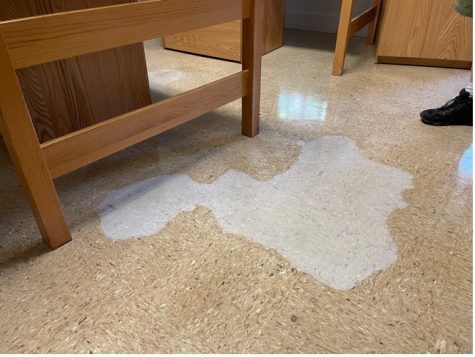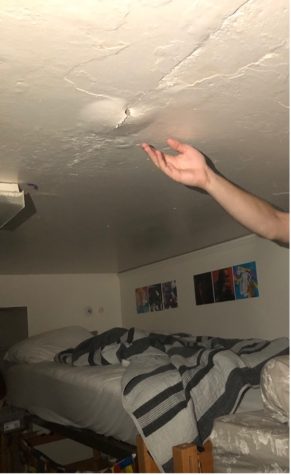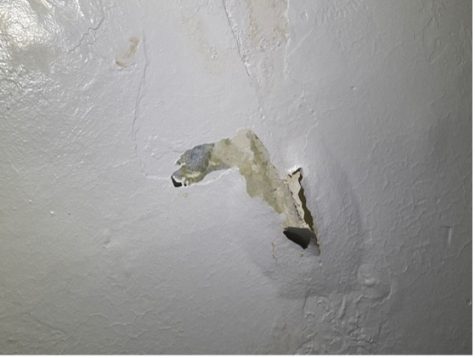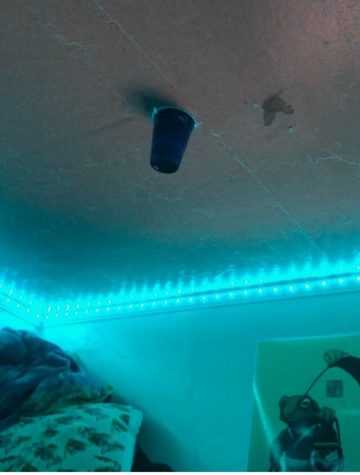On Tuesday, Nov. 2, University of Massachusetts sophomores Conrad Stewart, Ryan Devereaux and Evan Rovelli moved out of their dorm in Chadbourne Residence Hall. The group had been living in room 311 since late August and after several maintenance requests for a leaking ceiling, mold growth and potentially connected sickness, the University finally removed them from what the roommates described as “unfit” living conditions.
The residents questioned their room conditions from the moment they stepped foot on campus. Devereaux and Rovelli moved in before Stewart to fulfill their duties as Minute Movers. On Aug. 25, they noticed a bubble on the ceiling and a milky liquid on the floor, according to Rovelli, who filed an initial maintenance claim. The two residents cleaned up the floor themselves, set their room up around it and put a drip bucket under the bulge.

Stewart’s move-in date, about three days after his roommates’, coincided around the time the first maintenance staff came to check their room in response to the request. According to the residents, when asked, maintenance told them it was most likely wax mixing with the paint on the ceiling.
And so began the steady stream of maintenance members who would come into Room 311 over the next two months. None of which, the triple reported, were the same as the ones before.
“Each group that came in, they were a different group of people, there was no same maintenance group twice. And we just felt like there was little to no communication between the groups because they seem to be approaching it as, like, a new issue almost every time,” Devereaux said.
In the last week of September, a rainstorm caused the bubble on the residents’ ceiling to visibly increase in drippage. Devereaux said at this point, the bulge in their ceiling was no longer a bubble, but a visible hole.


“There was openness in our ceiling, we could see the concrete above and then the paint was, like, folding down under it,” Deveraux explained. “And then stuff started to grow in that. We could see something, it was starting to get dark around the edges. It was really gross, we were uncomfortable looking at it.”
“We weren’t sure if the thing growing in our ceiling was affecting our health at all, or the sicknesses that we were having,” Devereaux said, adding that he and Stewart had been battling illness all semester long. Rovelli spent very little time in the room compared to his other two roommates, and so was not exposed to what was growing. They think is the reason he did not maintain illness throughout the semester.
Rovelli, following the storm, sent an email about the leak and what they believed to be mold, adding a line about how Devereaux and Stewart’s illnesses could be connected to those living conditions. They received an immediate response, according to Devereaux. Seven maintenance members arrived at their door the next morning — another group of new faces.
“One of the guys that they had brought in, he said he was the environmental specialist,” Devereaux said. ”He climbed up on a little ladder, got up there and looked at our hole with whatever was growing in it, like pulled down his mask and just like sniffed at it.”
“And then he put his mask up, and he was like, ‘Oh, like you guys are going to be okay, this isn’t the bad mold.’” Devereaux added that the maintenance worker told them he was “trained to smell these things.”
“None of this seems official whatsoever,” Devereaux remembers thinking. “Even if this isn’t the ‘bad mold,’ there’s still mold growing in our ceiling,” he said.
According to the residents, maintenance returned later that afternoon to scrape off the moldy water-logged paint. Despite there still being a few other leaks in their ceiling, they thought that discoloration from the mold-ridden area was all that was left over.
“Halloween weekend, there was like two big rainstorms. And we then realized that when they scraped all this paint off, the people who were scraping the paint weren’t aware of the holes in the ceiling,” Deveraux said. “So nothing was plugged, nothing was sealed. In removing this paint, more holes had been exposed.”
Stewart woke up on the Thursday before Halloween in a puddle in his bed due to the dripping ceiling.
“When I woke up on my bed, about a quarter of it was completely soaked, including my feet, as there’s now a new bubble above my bed that started dripping,” Stewart recalled, “and there was mold from that bubble. There was still mold in the cement, about four feet from where I slept.”
Stewart spent his last nights in the room in a sleeping bag on the floor. The roommates placed buckets on his bed and taped cups to the ceiling to try to live under the conditions.

Rovelli sent what would be their final email to the University. A member of UMass Residential Life staff arrived at the room on Monday, Nov. 1.
“He came into our building and literally took one look and went ‘Okay, this is unfit to live in,’” Stewart said. “And then he determined that, as we had been living there for two months now, he goes, ‘It should have been deemed unfit to live in after the first week of getting leaks.’”
The staff member immediately made calls and contacted maintenance involved with the room. He then got in contact with the individuals who would be responsible for placing the roommates in other accommodations.
The roommates were then given less than 12 hours to pack up their belongings. They pulled an all-nighter packing up their entire triple, and by 9:30 a.m. on Tuesday, Nov. 2, movers came to help them move into their new assignments — assignments that split up the roommates due to the lack of available housing units on campus.
Devereaux, Stewart and Rovelli met in Gorman Hall in the spring 2021 semester and were looking forward to finally living together as sophomores. They are now separated across campus in freshman halls — Devereaux and Rovelli are living in Webster Hall, while Stewart was moved into Honors housing.
The roommates are disappointed with the lack of seriousness the University treated their living situation for the last two months.
“This building is literally falling apart, and we are still paying to live in it,” Deveraux said. “It’s made all of us feel just a tad uncomfortable that we are paying for housing, and we’re put in this place that is not only like, crumbling from the inside out, but that it’s not being fixed in the manner that it should be.”
After moving out, the roommates were made aware of roof repairs being made in Greenough 311 instead of in their room 311 in Chadbourne. According to Stevens, their maintenance requests were lost and, in some cases, resulted in maintenance being sent to the wrong building.
“There’s this massive blue bucket truck-slash-crane thing that’s been working on like the outside of Greenough, so right next to Chadbourne almost all semester,” Stevens said.
“That entire time they were working on Greenough 311 instead of working on Chadbourne 311,” he continued. “So, every time we saw that, that was the maintenance that was supposed to be happening for our room, but it was happening to the dorm next to us. And I’m not sure how that went on for as long as it did without anybody realizing that they were fixing a room that didn’t need to be fixed.”
Per the University, Residential Life has no record of anyone falsely maintaining Greenough Residence Hall. UMass has no comment beyond the fact that the only issue in Chadbourne 311 was a water leak that the University is actively working to fix.
This is not the only maintenance issue the roommates experienced while living in Central. Devereaux recalled incidents of power outages in the Baker-Chadbourne-Greenough cluster, as well as pipe leakages and restroom closures specifically in Chadbourne.
Sophomore Isabelle Stevenson has been friends with Devereaux, Rovelli and Stewart since spring of 2021 when they met in Gorman Residence Hall. She now lives directly above Chadbourne 311 and has also found mold in her room both under her heater and above her bed. Stevenson witnessed the events occurring in room 311 and claims that these conditions are not an isolated issue.
Stevenson recalled the numerous groups of maintenance workers visiting 311 to determine what was going on, though seconds that it was not until Rovelli mentioned that his roommates had illnesses of “unknown origins” that the University took their claims seriously. She thinks that in addition to potentially contributing to their poor physical health, that their living conditions have been placing a toll on their mental health, as well.
“Your room is supposed to be a place where you can prepare for your next day or relax from your previous few,” Stevenson said. “Having a place that only brings about concern for your health and safety is by no means anything less than stressful.”
Stevenson wants this situation to push the University to take all housing condition claims seriously. “I really just hope it sheds light on some really necessary repairs that need to be done. I know this building itself was built in 1947, and the last known valid health inspection expired in 2019,” she said.
The University refuted the claims that the BCG cluster of buildings has not been checked for any form of code since 2019.
“All residential halls are inspected thoroughly every summer after students have moved out. Routine maintenance is performed on any item that needs maintenance during the summer. Emergency maintenance is performed on an ongoing basis 24/7/365. There are no known code violations or hazards, per EHS,” Deputy Director of the Office of News and Media Relations, Mary Dettloff said in an email statement.
Since moving out, the only communication between the University and the roommates has been one email on Nov. 8, identifying repairs needing in the gutters, downspout and masonry. It stated that the residents will remain in their new assignments until the infiltration is “remedied.” There was no mention of mold growth by the University.
The Resident Assistants in Chadbourne were not made aware of the extent of the issues even after the roommates were moved out, despite concerns of the widespread leaks and mold potentially being airborne.
In a statement to the Collegian, UMass Resident Assistant/Peer Member Union Representative Matthew Donlevy said the RAPMU is aware of the unsafe state of buildings across the UMass campus, including many of the dorms on campus that are “in desperate need for renovation or should be demolished outright and replaced with new construction.”
According to the RAPMU, “the University has equivocated on this issue when confronted” in the past. The Union approaches dorm safety as a contractual issue, as they it believes its members’ living conditions are linked to their working conditions.
“The mold instance in particular was on our radar, and we brought it to the University admin to be addressed. They suggested [Health and Safety] issues are outside of their purview and that they must be handled by the university’s [Emergency Health and Safety] team,” Donlevy continued in the RAPMU’s email statement.
“We have discussed filing a grievance as an avenue to push the University to rectify the issue rather than giving us, and the members we represent, the runaround,” he said.
“We will certainly demand updated EH&S reports related to the mold in Chadbourne and a few other buildings we’ve been keeping a keen eye on. We are disappointed that student’s need to get sick before the university takes the necessary steps to intervene.”
According to all three of the original Chadbourne 311 roommates, a Resident Assistant in the cluster is drafting a petition calling on the University to evacuate the buildings in question due to widespread mold growth and building leaks. Part of that petition includes a request for refunds for those impacted.
The University made a comment on Nov. 8 about the claims. According to Dettloff, “Three students needed to be moved out of a Chadbourne room last week due to water infiltration from the roof. In order to make repairs, the students needed to be relocated. There was no report of mold related to this situation.”
The Residential Housing Association could not be contacted at the time of publication; Emergency Maintenance Services did not respond to the Collegian’s request for comment.
Ella Adams can be reached at [email protected] and followed on Twitter @ella_adams15.




















AJ Alum • Nov 29, 2021 at 10:45 am
Why did no one called the board of health & had it inspected? This is a health code violation! Call your local state reps office! Call the local newspapers & the Boston Globe. Room fees / costs for living on campus are expensive – this entire situation is beyond disrespectful to the students who are paying for on-campus housing. This situation should not happen.
Ryan Devereaux • Nov 21, 2021 at 11:21 pm
Thank you so much for sharing our story Ella!